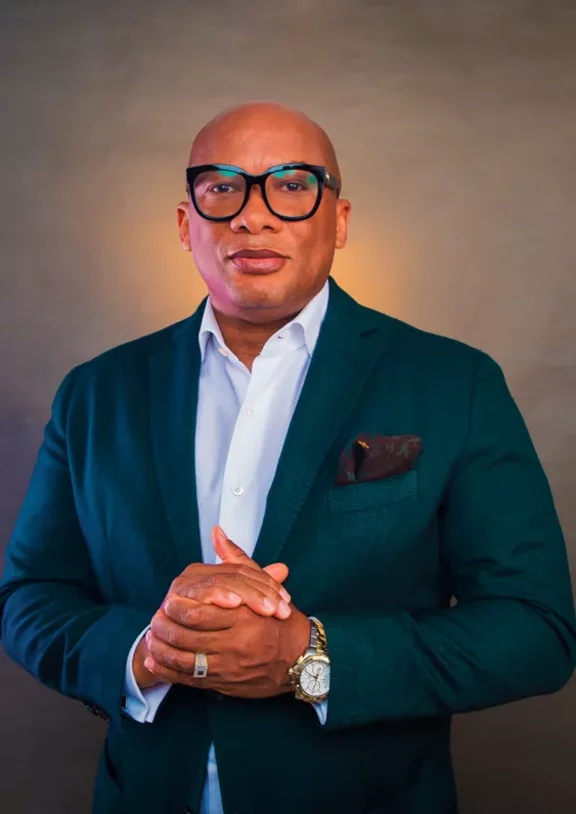Afro Trailblazers (Part 21): Mitchell Elegbe of Interswtich

Did you know that Interswitch, a Nigerian financial technology company, was valued at $1 billion following Visa's acquisition of a 20% stake in the company in November 2019? Did you also know that Interswitch is the behind-the-scenes system that helps your money move when you use an ATM, swipe your card at a store, buy airtime, or pay bills online? It connects banks, apps, and payment platforms so that transfers, withdrawals, and purchases happen without too much hassle?.
Whether you're paying your electricity bill on Quickteller or using a Verve card at a supermarket, chances are Interswitch is quietly doing the work in the background, making everyday transactions fast, secure, and possible across Nigeria and parts of Africa.
In the story of Africa’s evolving fintech landscape, Mitchell Elegbe’s name continuously surfaces. As the founder and CEO of Interswitch, one of the continent’s earliest digital payments platforms, Elegbe didn’t start out trying to be a fintech icon. He was simply solving a problem he’d experienced firsthand—and then he kept solving more.
Early Life: Foundation in Hustle and Constraint
Elegbe was born in Benin City, Nigeria, in 1973. His father died before he was born, and he was raised by his mother and later by an uncle in Delta State.He studied Electrical/Electronic Engineering at the University of Benin. It wasn’t glamour that drew him to technology—it was practicality.
That mindset would later shape how he approached product development and business modeling. Financial instability marked much of his early life, and like many Nigerian students, he had to find ways to support himself.
From selling shirts to recording music on audiotapes, Elegbe showed an early inclination for entrepreneurship, not in a squeaky clean, structured Silicon Valley sense, but in the gritty, survival-driven way that defines much of the African informal economy.
The ATM That Sparked a Fintech Company
The turning point came while working in Scotland as a field engineer for Schlumberger. An ATM swallowed his card—something that today might be a minor inconvenience. But back then, it was a stark reminder of how far behind Nigeria was in terms of financial infrastructure. The country didn’t even have functional ATMs at the time. Elegbe saw the gap, not just as a user frustrated by inefficiency, but as a builder looking at a broken system.
When he returned to Nigeria, he pitched the idea of an electronic transaction switching platform. Few bought into it. Banks were skeptical, cash was king, and the concept of digital payments seemed premature. Elegbe didn’t wait for validation. With support from his then-employer, Telnet, and consulting help from Accenture, he launched Interswitch in 2002. He was not the initial CEO, as shareholders first sought an expatriate for the role, but he eventually took the reins of his company.
Interswitch: Building the Infrastructure First
Interswitch didn’t start with flashy apps or sleek branding. It started with infrastructure—the backend rails that would allow banks, merchants, and consumers to move money electronically. That focus proved to be the right call. While others chased user acquisition and growth at all costs, Elegbe was building something that could support a fintech ecosystem.
Products like Quickteller and Verve followed—visible, user-facing tools that made Interswitch a recognizable name. But the real work happened behind the scenes: connecting banks, creating standards, and building trust in digital systems in a market where trust was hard to come by.
Growth, Investment, and a Measured Rise
Over the next two decades, Interswitch expanded steadily. It acquired East Africa’s Paynet Group, partnered with Discover Financial Services, and even entered a blockchain-focused collaboration with Interstellar Inc. In 2019, Visa invested $200 million, pushing Interswitch’s valuation past $1 billion and securing its place as one of Africa’s few fintech unicorns.
This wasn’t a hyper-growth story driven by hype and burn rates. Elegbe took a more methodical route, refusing to give products away for free without a plan to monetize, insisting on solving real customer pain points before scaling, and focusing on profitability from early on. That philosophy stood in contrast to many African startups chasing foreign venture capital by mimicking Western models.
Challenges, Trade-Offs, and Reality Checks
Elegbe’s path was far from smooth. Early rejection was persistent. The market needed not just education, but behavior change. Regulatory friction, infrastructure deficits, and consumer distrust were constant hurdles.
One of the key lessons he’s shared—especially with younger fintech founders—is that not every market can be disrupted the same way. What worked in San Francisco might flop in Lagos if it doesn’t reflect how people actually use and perceive money. Elegbe's edge was his local understanding—and his willingness to build within the limits of the environment rather than around them.
Leadership Without the Spotlight
Though he has won numerous awards, including the EY Entrepreneur of the Year and the Fintech Icon of the Year (2024), Elegbe is not a headline-chaser. His leadership is more operational than theatrical. He has spent years refining business models, expanding regionally, and investing in ecosystem growth through mentorship and advisory roles, such as with Endeavor Nigeria.
Lessons from the Journey
Elegbe’s story isn’t about overnight success or unicorn hype. It’s about long-term infrastructure building, solving market-specific problems, and scaling only when the business case makes sense. In a region where digital finance is still maturing, Interswitch's longevity says as much about strategy as it does about innovation.
There’s also a broader takeaway for aspiring entrepreneurs: You don’t need perfect conditions to start, but you do need clarity about the problem, discipline in execution, and the patience to build something that lasts. It also serves as a quiet warning: the goal isn’t just to launch, it’s to endure.
With markets still evolving and competition intensifying, Elegbe’s focus on fundamentals—profitability, infrastructure, and local relevance—offers a blueprint for a more sustainable kind of African entrepreneurship.
Check out our Entrepreneurship category to find out who else made the list of African Trailblazers, and what you can learn from them.
You may also like...
Super Eagles Fury! Coach Eric Chelle Slammed Over Shocking $130K Salary Demand!
)
Super Eagles head coach Eric Chelle's demands for a $130,000 monthly salary and extensive benefits have ignited a major ...
Premier League Immortal! James Milner Shatters Appearance Record, Klopp Hails Legend!

Football icon James Milner has surpassed Gareth Barry's Premier League appearance record, making his 654th outing at age...
Starfleet Shockwave: Fans Missed Key Detail in 'Deep Space Nine' Icon's 'Starfleet Academy' Return!

Starfleet Academy's latest episode features the long-awaited return of Jake Sisko, honoring his legendary father, Captai...
Rhaenyra's Destiny: 'House of the Dragon' Hints at Shocking Game of Thrones Finale Twist!

The 'House of the Dragon' Season 3 teaser hints at a dark path for Rhaenyra, suggesting she may descend into madness. He...
Amidah Lateef Unveils Shocking Truth About Nigerian University Hostel Crisis!

Many university students are forced to live off-campus due to limited hostel spaces, facing daily commutes, financial bu...
African Development Soars: Eswatini Hails Ethiopia's Ambitious Mega Projects

The Kingdom of Eswatini has lauded Ethiopia's significant strides in large-scale development projects, particularly high...
West African Tensions Mount: Ghana Drags Togo to Arbitration Over Maritime Borders

Ghana has initiated international arbitration under UNCLOS to settle its long-standing maritime boundary dispute with To...
Indian AI Arena Ignites: Sarvam Unleashes Indus AI Chat App in Fierce Market Battle

Sarvam, an Indian AI startup, has launched its Indus chat app, powered by its 105-billion-parameter large language model...






